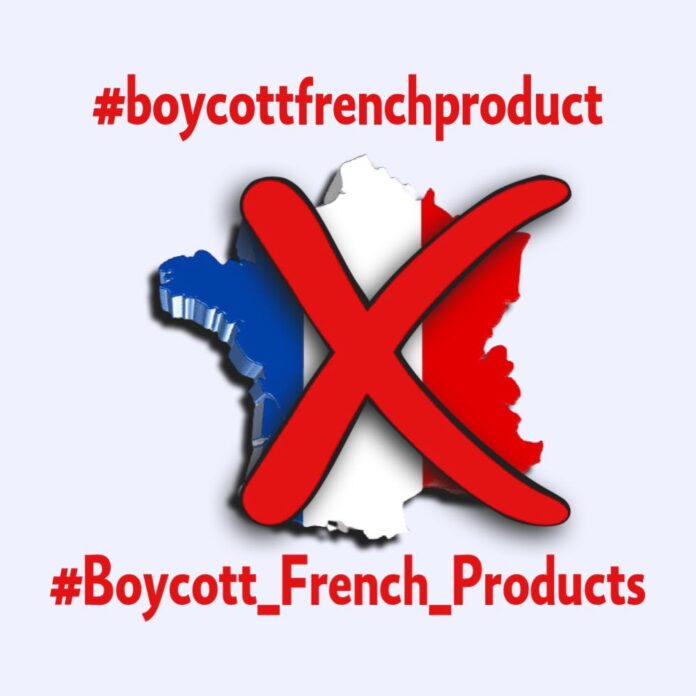Popular campaigns are escalating in Egypt and the Arab world calling for a boycott of French products and goods due to statements made by French President Emmanuel Macron which were considered offensive to Islam.
Macron affirmed in a video message his insistence on publishing cartoons offensive to Islam as “a victory for secular values,” despite the stabbing incident of two veiled Muslim women under the Eiffel Tower in Paris. Macron announced in his speech that his country will not abandon the satirical cartoons, in his speech about a French teacher who was killed after publishing insulting pictures of the Prophet Muhammad, peace be upon him.
In Egypt and Arab countries, activists launched several hashtags to denounce Macron’s statements, demanding French products be boycotted due to Macron offending the Prophet. Egyptians posted under hashtags on social media, considering that Macron’s insistence on publishing offensive images of the Prophet of Islam is not a matter of freedom of expression. Thousands changed their personal photos on social media to call for a boycott of French goods and products, and they published tables of the names of French products and companies that should be boycotted. The tweeters called on all Muslims around the world to correspond with the French ambassadors, and to express their condemnation of what is happening with the demand that the French state protect the Muslim minority. Thousands of tweets confirmed that an economic war and heavy losses for France would be the appropriate response to Macron. Others published images mocking the French president.
Popular campaigns
Despite the widespread popular campaigns in Egypt, there has been no official response or condemnation from Egyptian officials, except a statement from the Sheikh of al-Azhar. Some media professionals attacked Macron’s position and considered it a source of discord and aid to spread extremism and violence. During recent days, the pressure and the raids increased, targeting Islamic civil society organisations in France, against the background of killing a history teacher named Samuel Paty, 47, who showed his students pictures offensive to Islam.
Macron described the killing of Paty as undermining freedom of expression and an “Islamic terrorist attack.” His speech was widely rejected in Egypt and other Islamic countries, and his statements were described as incitement to hatred, and a popular campaign to boycott French products was launched.
For his part, the Sheikh of al-Azhar, Ahmed al-Tayeb, said that the Islamic world is witnessing a “systematic campaign to include Islam in political battles.” Al-Tayyib added, in a post in Arabic, English, and French, on his Facebook page, that this campaign began with a malicious attack on the Prophet of Mercy, may God bless him and grant him peace. The Sheikh of al-Azhar continued: “We do not accept that our symbols and holy sites be victims of cheap speculation in the market of electoral politics and conflicts.”
Al-Tayyib sent a message to those who justify insulting the Prophet of Islam, saying, “The real crisis is because of your intellectual duplicity and your narrow agendas, and I remind you that the most important responsibility of leaders is the maintenance of civil peace.” He considered that what happened does not preserve societal security, does not respect religion, does not protect people from falling into strife, and fuels conflict in the name of freedom of expression.
Frequent abuse
Al-Azhar condemned the stabbing incident of two Muslim women in Paris, describing it as “a hateful terrorist incident perpetrated by extremists.” The Muslim community in France, which numbers more than five million people, lodged a complaint due to the increasing protests and restrictions against Islamists due to the French government’s crackdown on mosques and Islamic organisations. The French Interior Minister Gerald Darmanan had previously stated, on September 27, that his country was fighting a war against what he called “Islamic terrorism” during a visit to a synagogue near the capital Paris.
Last July, French Prime Minister Jean Castex said that “combating Islamic extremism” is one of his “major concerns” during his announcement to the national assembly of his government’s general policy statement. It is noteworthy that in 2006 a similar campaign was launched to boycott Danish goods and products, after magazines in Copenhagen published caricatures offensive to Islam that sparked demonstrations and widespread condemnation.








